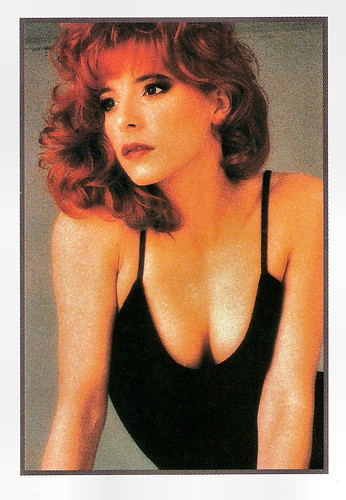
French postcard, no. DK 602.
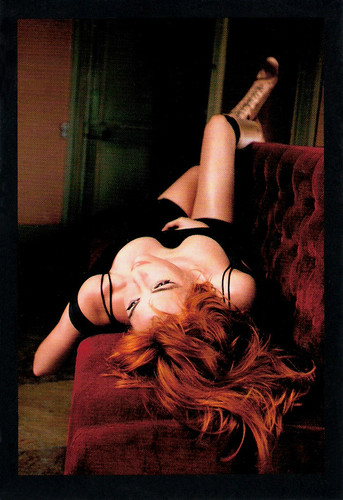
French postcard by Stuffed Monkey / Universal / Polydor. Photo: Dominique Issermann. Design: Henry Neu.

French postcard, no. DJ 2.
Controversial, poetic and explicit
Mylène Farmer was born Mylène Jeanne Gautier in Montréal (IMDb), Quebec or in Pierrefonds, France (Wikipedia) or in 1961. Her parents moved from France to Canada in the late 1950s as Farmer's father, Max, pursued an engineering contract on a dam. Her family moved back to France when she was eight, settling in the Parisian suburb of Ville-d'Avray.
At 17, Farmer discovered acting and took a three-year course at the Cours Florent, a drama school in Paris. Changing her name to Mylène Farmer as a tribute to her idol, 1930s Hollywood actress Frances Farmer, she began to earn a living as a model acting in several TV ads. In 1984, Farmer met Laurent Boutonnat, a young film student, after answering a newspaper ad looking for an actress for a small film he was working on. Farmer and Boutonnat became friends and forged a creative partnership, writing and producing the music.
He wrote her first song, 'Maman a tort', about a young girl's love for her female nurse. It became a mild success in March 1984. Boutonnat, whose ambition was to become a film director, would be the force behind Mylène’s videos and he wrote the music of her songs. Farmer would write the lyrics.
In the following years, Farmer gained fame with songs featuring controversial yet poetic lyrics and explicit music videos: 'Libertine', the lead single of her first album, was released in March 1986 and set the tone for Farmer's musical style. The sensual, romantic lyrics were inspired by 19th-century literature. As for the video, which has a running time of over 10 minutes, Boutonnat was inspired by the film Barry Lyndon (Stanley Kubrick, 1975) and the novels by Marquis de Sade, thus giving the video a cinematic style. Farmer, lit by candlelight, is shrouded in mystery and sexual ambiguity. The video contained the first full-frontal nudity appearance by a singer in a major music video.
In 1988, Boutonnat and Farmer started to work on her follow-up album, 'Ainsi soit je...'. This darker and more sexually ambiguous album features songs inspired by Charles Baudelaire and Edgar Allan Poe. The album sold 1.8 million copies and the song 'Pourvu qu'elles soient douces', containing hints of sodomy; became Farmer’s first #1 hit.
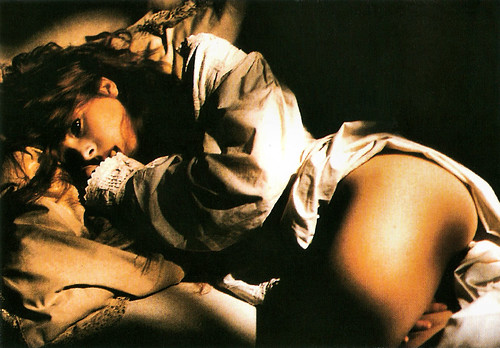
French postcard, no. MF2.
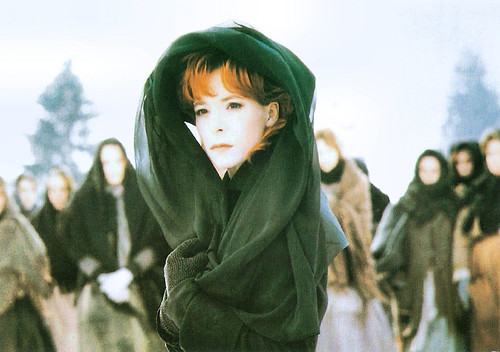
French postcard, no. MF4.
Blood and sex-charged
Her third album, 'L'Autre...' (1991), and the single 'Désenchantée' made Mylène Farmer a superstar in France. The lyrics approached a larger scope of subjects than before such as religion ('Agnus Dei'), politics ('Désenchantée') and press criticism ('Je t'aime mélancolie'). 'Désenchantée' spent 9 weeks atop the French chart and became one of the best-selling French singles ever. It was also a hit in Belgium, Canada, Austria and the Netherlands. It was accompanied by a video in which Mylène plays a rebelling prisoner in a concentration camp-like facility.
Another successful song from the album, 'Beyond My Control' had a blood-and-sex-charged video which was banned from airplay. The success of the singles helped their parent album sell close to 2 million copies in France alone.
In 1991 a disturbed man who had been stalking Farmer entered the Polydor Records headquarters in Paris, held employees at gunpoint demanding to talk to Farmer, and killed the receptionist. Following this occurrence, Farmer shunned media attention and left France to live in Los Angeles for a few weeks.
In late 1992, she released the remix album 'Dance Remixes', including the single 'Que mon cœur lâche', dealing with AIDS and sexual relations. The song was accompanied by a video directed by Luc Besson - the first time that a Farmer video wasn't directed by Boutonnat. In the video Farmer plays an angel sent down to earth by God, to save mankind from itself. God refuses to send Jesus again: "Last time it was a disaster”.
In the meantime, Farmer starred in Giorgino (1994), the feature debut of Laurent Boutonnat. The 3-hour-plus film, shot in English, was a critical and commercial flop. Budgeted at 80 million Francs, it was seen by only 60,000 people and recovered only 1% of its budget. The bad reception was particularly hard on Boutonnat, who would not direct again for 13 years. Farmer decided to leave France to take a long break in the USA.
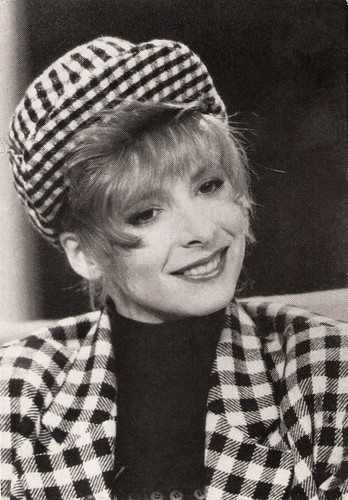
French postcard, no. 201.
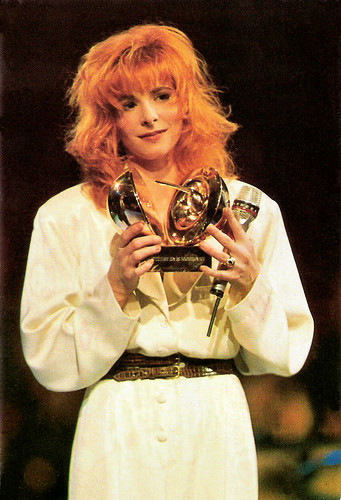
French postcard, no. A104.
Twelve #1 singles
During her time in California, Mylène Farmer started to write her fourth studio album, 'Anamorphosée'. The album was launched by the rock song 'XXL', and a video directed by Marcus Nispel featuring Mylène strapped to the front of a moving train. The single became her first to debut at #1. 'Anamorphosée' debuted at #2 in the album charts and sold half a million copies in 3 months. Another single, the jazzy pop ballad 'California' featured a highly acclaimed video directed by Abel Ferrara.
Her 5th studio album 'Innamoramento' went straight to #2 on the charts. The video for the second single, 'Je te rends ton amour' sparked controversy because of its religious imagery. It was condemned by the Catholic Church and banned by many networks. Later released as a video single, it became the biggest-selling video single in France. In late 1999, Farmer embarked on her third concert tour, the Mylenium Tour, which set the record of the highest-grossing tour by a non-English speaking artist. In 2000, Farmer and Boutonnat had assembled songs and video ideas they felt appropriate for a younger, new star, Alizée. They wrote and produced Alizée's albums 'Gourmandises' and 'Mes courants électriques'. Alizée's biggest hit, 'Moi... Lolita' reached the top of the charts and she became the most successful French singer that year.
In December 2004, Farmer presented the album, 'Avant que l'ombre...' which spent several weeks at #1 and sold nearly a million copies. Moby invited her to record a duet, a French version of 'Slipping Away' - her 4th #1 single in France. In 2007, Laurent Boutonnat, directed his second feature film, Jacquou le Croquant (2007), featuring Gaspard Ulliel. Farmer recorded the theme song of the film, 'Devant soi', for the end credits.
During that period, she also worked on the French version of Luc Besson's animated feature Arthur et les Minimoys/Arthur and the Minimoys (2006), lending her voice to Selenia, the character voiced by Madonna in the international version. She later returned to dub the sequels, Arthur et la vengeance de Maltazard/Arthur 2 – the Revenge of Maltazard (Luc Besson, 2009) and Arthur 3: la guerre des deux mondes/Arthur 3: The War of the Two Worlds (Luc Besson, 2010). Farmer’s seventh studio album, 'Point de Suture' (2008) contained five #1 singles. Farmer then had a record of nine #1 hits in France, more than any other artist in French music history.
In the latter half of 2010, Mylène Farmer hired RedOne, known for his work with Lady Gaga to produce and write the music for the single 'Oui mais... non'. It hit #1 on the French download chart. Considering the decline in music sales, it's her most successful single since 2002. This also makes her the only French singer to have number-one hits in four consecutive decades. The following singles, 'Bleu Noir' and 'Lonely Lisa', hit the top of the charts too, expanding her record with twelve #1 singles. The album 'Bleu Noir' (2010) was produced by Farmer, RedOne, Moby and Archive. It entered the French album chart at #1 and remained at the top for three consecutive weeks. It was followed by another successful album, 'Monkey Me' (2012). Her later albums included 'Interstellaires' (2015) including the hit 'Stolen Car', a duet with Sting, 'Désobéissance' (2018) and the live album 'Live 2019' (2019). In 2018, she starred in the Horror film Ghostland (2018), written and directed by Pascal Laugier. Myléne Farmer's latest album is L'Emprise (2022).
Mylène Farmer sings 'Oui Mais... Non' (2010). Source: MyleneFarmerVEVO (YouTube).
Mylène Farmer sings 'Je Te Dis Tout'. Source: MyleneFarmerVEVO (YouTube).
Sources: Jason Birchmeier (AllMusic), Wikipedia and IMDb.
This post was last updated on 1 March 2024.
No comments:
Post a Comment